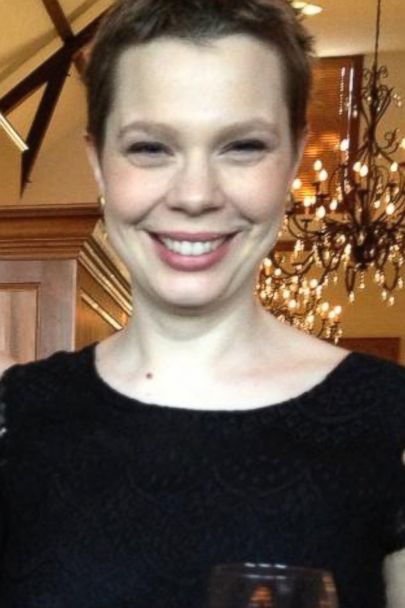Why Breast Cancer Is Embarrassing

Emily Helck was diagnosed with breast cancer when she was 28. (Credit: Courtesy Emily Helck)
By Emily Helck:
There's a lot that people say about cancer. It's scary, it's tough. It's no big deal. Chemo will save you. Chemo will kill you. Almost everything you can think of has been said a million times over.
But here's something you don't hear a lot: Cancer is embarrassing.
Especially, I think, when you're a young adult. When I was diagnosed at 28, I had just finished packing away the pains and fears of my adolescence when breast cancer came and dumped them all out again.
I could start an Advice Animal style Internet meme with all the awkward cancer moments I've experienced in the last year of breast cancer treatment. (Awkwardly Bald Eagle? IV Stand Panda? I'm open to suggestions.)
Embarrassing cancer moments range from the subtly undignified (hot flashes during dinner) to the mortifying (runaway surgical drain during a meeting).
When I had tissue expanders (temporary implants used to stretch muscle and skin to prepare for reconstruction), hugging friends and family became fraught: The expanders were rock hard, like real-life versions of Madonna's torpedo bra. Was I hurting people, or just freaking them out every time we embraced? And that's just the physical stuff, the slapstick. Cancer messes with your brain, resulting in awkward memory loss, and your heart, resulting in random crying.
A few months ago, after spending most of the year imitating some of the finer qualities of my favorite lichen, I went to a party. By myself, and where I knew only the host. I made conversation, and mingled, and only hid in the bathroom for about six minutes.
So I was considering the evening a success when I began a nice chat with another party-goer about contemporary art, the field we both work in. Somehow the conversation shifted to Las Vegas, and things went downhill. I made some comment about that controversial ID carrying law in Las Vegas, New Mexico, and then froze.
Wait. I thought to myself. That's wrong. Walter White lives in New Mexico, and gambling is illegal in 'Breaking Bad.' Where is Las Vegas? WHERE? (And forget that the law is in Arizona. I didn't realize that until weeks later.)
The rusty gears in my head were slow and very creaky to start, chemo having sucked out all their oil. A puzzled look had spread across my conversation partner's face. I had been passing, up until that moment, for someone with normal cognition. Because of where I was, I felt I couldn't just blurt out "Chemo brain!" and laugh off my mistake, the way I would with my husband or sister. Instead I just stood there, squirming, until he politely changed the subject.
The embarrassment goes both ways sometimes. It can be hard for friends of a young adult cancer patient, who've likely never experienced the illness of a peer, to know where they fit. There were a large number of acquaintances who would peer curiously at my headscarf but say nothing. Maybe I should have worn a sign that read "Ask me about my invasive ductal carcinoma!"
As a friend or co-worker or acquaintance, it's hard to know what to say, when it's OK to make a joke, and when it's OK to cry.
When I was in middle school, we watched a video about primal scream in social studies. We tortured the teacher by tittering and giggling through the whole thing. People expressing pure emotion was funny to us - as middle school kids, the definition of self-conscious, we worked hard to hide all that.
Cancer is weirdly similar. Over the past year, I've hidden my emotions in that same way many times. When someone would ask, "How are you?" I never replied, "Well, my radiation burns are making my skin melt off my body, and I'm terrified about what's next." Instead I would say I'm fine, to avoid embarrassing myself, and the other person, who I assumed wouldn't know what to say.
I think the cure for all of it, on both sides, is openness. Laying it all out can be cathartic and important and refreshing. Last month, I posted a time-lapse video of my year of treatment. The photos aren't pretty, and some of them (shocker) might be considered kind of embarrassing. But I don't feel embarrassed by the video. Because it is a true expression of that time, it doesn't bother me that my drains, or my bald head, are showing. So much of shame comes from secrets.
When telling one friend about my diagnosis, she said she was sorry that she didn't know what to say. "I just feel like screaming." She was right. There were no words. And that expression of honest emotion was so much more comforting than a canned line about resilience.
With all this openness and honesty, there will inevitably be times when we say or do the wrong thing, and that's OK. None of us knows quite what we're doing here. As long as what you are saying comes from a place of love, I think you should go for it. Sometimes there will be a misstep. But being there, whether it be for your friend, your mom, your cousin, whoever, is too important to let a few awkward moments get in the way.
Emily Helck is a 29-year-old artist from Jersey City, N.J. When she began chemotherapy in September 2012, she started her blog, "Real Tumors of New Jersey." She posted a video containing year of self portraits to her blog on Sept. 29, which has since gone viral.
A Day in the Life is a series of blogs written by people who are living with medical conditions.